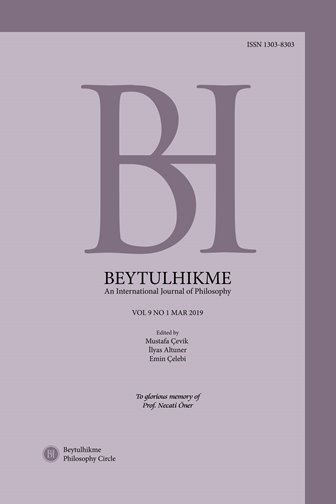Author :
Abstract
Bu çalışmada, Lewis’in En İyi Sistem analizini ve bu sistemin istisnai yasalara nasıl yer verdiğini açıklamayı hedeflemekteyim. En İyi Sistem hesabı, hem minimalist hem de karşı olgusal düzenlilik teorileri için alternatif bir bakış açısı sağlamak amacıyla başlatılmıştır. Basit düzenlilik teorisi bir yasa gibi görünen bazı genellemelerin ya da tesadüfi olarak kurulan bazı düzenliliklerin olduğu sorunlarla karşı karşıyadır. O tesadüfi genellemeyi hesabından çıkartmaya çalışır. Fakat bununla birlikte, en iyi system analizi yasalar ve tesadüfler arasında nasıl ayrım yapılacağı sorununu çözebilir.
Keywords
Abstract
In this paper, I aim to explore Lewis’s best system analysis and how it can accommodate laws with exceptions. The Best System Account has been introduced to provide an alternative view for both minimalist and counterfactual theories of regularities. Simple regularity theory faces problems in which there is some generalization that seems to be a law or some regularities that are established accidentally. It tries to exclude the accidental generalization from the account. However, the best system analysis can solve the problem of how to distinguish between laws and accidents.
Keywords
- Brandon, D.-M. (2001). Lossy Laws. Oxford, UK: Blackwell Publishers.
- Brewka, G. (1991). Nonmonotonic Reasoning: Logical Foundations of Commonsense. Cambridge: Cambridge University Press.
- Callender, C. & Cohen, J. (2010). Special Sciences, Conspiracy and the Better Best System Account of Lawhood. Erkenntnis, 73, 427-447.
- Cohen, J. & Callender, C. (2009). A Better Best System Account of, C. (2009). A Better Best System Account of Lawhood. Philosophical Studies, 145, 1-34.
- Delgrande, J. P. (1998). On First-Order Conditional Logics. Artificial Intelligence, 105, 105-137.
- Lewis, D. (1973). Counterfactuals. Oxford, Blackwell.
- Lewis, D. (1986). Postscript to “A Subjectivist’s Guide to Objective Chance”. Philosophical Papers, vol. 2. Oxford: Oxford University Press, 114-132.
- Pelletier, F. J. & Asher, N. (1997). Generics and Defaults. Handbook of Logic and Language. (Eds. J. van Benthem & A. ter Meulen). Amsterdam: Elsevier, 11251177.
- Schrenk, M. (2006). A Theory for Special Science Laws. Selected Papers Contributed to the Sections of GAP.6. (Eds. H. Bohse & S. Walter). Paderborn: Mentis.
- Schrenk, M. (2007). The Metaphysics of Ceteris Paribus Laws. Frankfurt am Main: Ontos.
- Schrenk, M. (2008). A Lewisian Theory for Special Science Laws. Selected Papers Contributed to the Sections of GAP.6. (Eds. D. Bohse & K. Dreimann, & S. Walter). 6th International Congress of the Society for Analytic Philosophy. Paderborn: Mentis.
- Schurz, G. (2002). Ceteris Paribus Laws: Classification and Deconstruction. Er- kenntnis, 57, 351-372.
- Unterhuber, M. (2014). Do Ceteris Paribus Laws Exist? A Regularity-Based Best System Analysis. Erkenntnis, 79, 1833-1847.
- Weatherson, B. (2014). David Lewis. http://plato.stanford.edu/entries/david-lewis.
